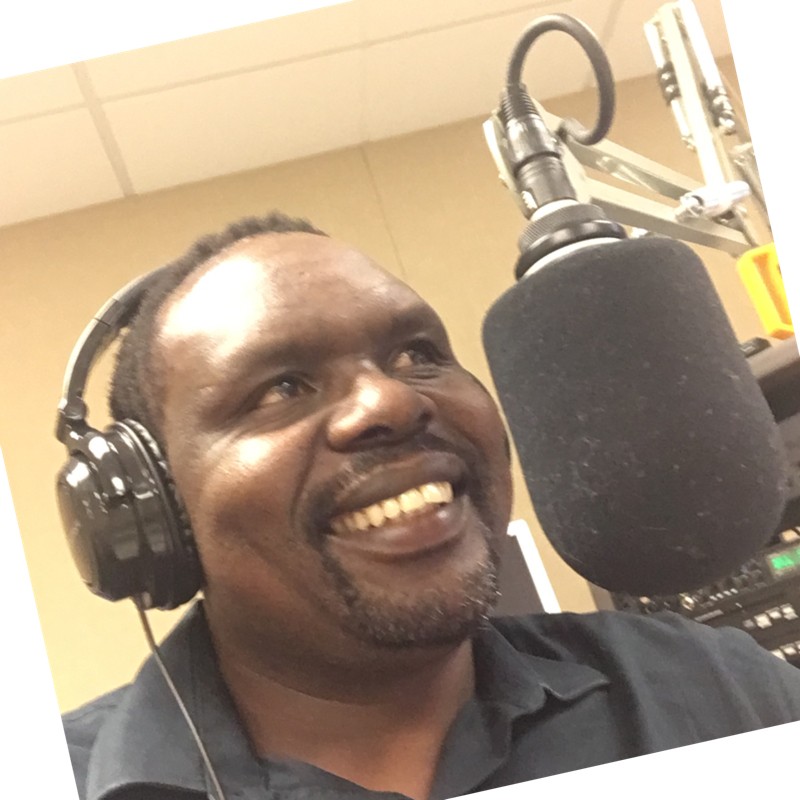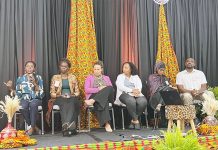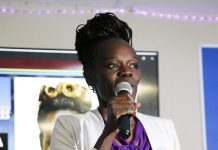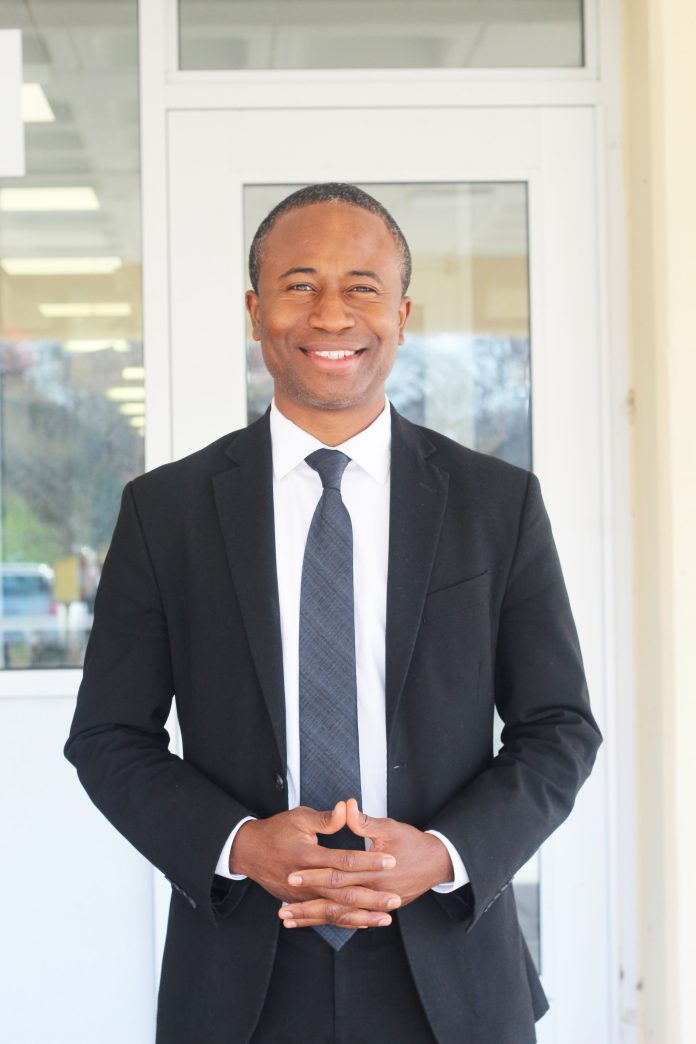
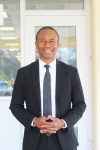
When 18-year-old Mike Elliott went to Brooklyn Center City Hall for a permit to hold a carwash fundraiser for his high school prom, he did not know that was his first step to making history as the city’s first Black mayor.
“I remember that day very vividly,” says Elliott, during a recent interview in the council chambers at City Hall.
It was Elliott’s first time ever visit to City Hall, and his first introduction to how local government functions.
“The fact that I – a young person – was able to walk into City Hall and get what I had come for was fascinating,” he says.
Elliott was intrigued because that was not how government worked in Liberia, his birthplace, which he fled for the United States as a refugee when he was 11 years old. Even though as a child he had family members who worked in government in Liberian, he did not feel welcome at government offices.
“In Liberia, the government was something that happened over there in that building, and the executive mansion,” he says. “You were not welcome to just walk up there.”
After high school, Elliott went to study at Hamline University in St. Paul. He graduated with a B.A. in international management, with a minor in political science. He went into entrepreneurship and founded a tutoring company called Fastforward Education. A year after graduation, he was hired to develop the Brooklyns Youth Council, a joint program of Brooklyn Center and neighboring Brooklyn Park that gives youths opportunities for input in the decision-making process.
As he learned more about the functions of city government, Elliott began to think that there was a need for change in Brooklyn Center to reflect the growing diversity of the suburban city of 33,000, located north of Minneapolis, on the west bank of the Mississippi River. And he couldn’t think of anyone better to lead that transformation.
“I thought I was the right person to be mayor of Brooklyn Center because I brought some unique perspectives and skillsets that would be beneficial in leading the city to where it needed to go,” he says.
He entered the mayor’s race in 2014, but lost by only 145 votes. Elliott, however, says his first campaign was major success because it galvanized African immigrants and other people of color who didn’t even know they had the power to influence local politics.
“Sometimes when you are trying to drive a nail home, you have to hammer it more than once,” he says. “We learned important lessons that we could apply in the next campaign.”
Indeed, four years after his first run, Elliot applied those lessons and struck the nail right on the head. In 2018, the people of Brooklyn Center made history by electing him as the first Black and person of color to lead the city.
As their population in Minnesota continues to grow, African immigrants are increasingly coming together to elect members of their community to represent them in government. Over the last few elections, several African-born Minnesotans have been elected to seats in small suburban cities like Brooklyn Center, the Minnesota state legislature, and of course to Capitol Hill, in the case of Rep. Ilhan Omar, who in 2020 was overwhelmingly re-elected to a second term to represent Minnesota’s 5th Congressional District in the U.S. House of Representatives. Whereas those newly-elected to high-profile offices like the U.S. Congress have their parties and caucuses to help them settle, newcomers to local governments often find themselves without mentors when they begin their terms.
Wynfred Russell, who like Elliott was born in Liberia and came to the United States as a refugee, was elected in 2018 as a councilmember to represent the West District of Brooklyn Park, a city of 86,000. Mshale catches up with him at a coffee shop on a Monday afternoon, as he prepares for a city council meeting scheduled later that evening. He says he remembers being “lost” during his first days in office.
“I realized very quickly that there is a difference between campaigning, or being an advocate, and governing,” he says.
The challenges of lack of mentorship have brought African-born elected officials closer, often consulting each other, Russell says. On his first day in office, for example, he remembers receiving a call from Richard Paul, a Sudanese-born refugee, who had been elected to the city council in nearby Blaine.
“Richard Paul called me and said, ‘Man, I don’t know what I am supposed to do,’” Russell says. “But I was in the same situation.”
Russell says that one of the reasons African immigrants find themselves isolated when they get elected is that white people, who have historically occupied positions of power, do not know how to handle those like him who are challenging the status quo and breaking barriers. He also thinks there are some who see newcomers like him as threat.
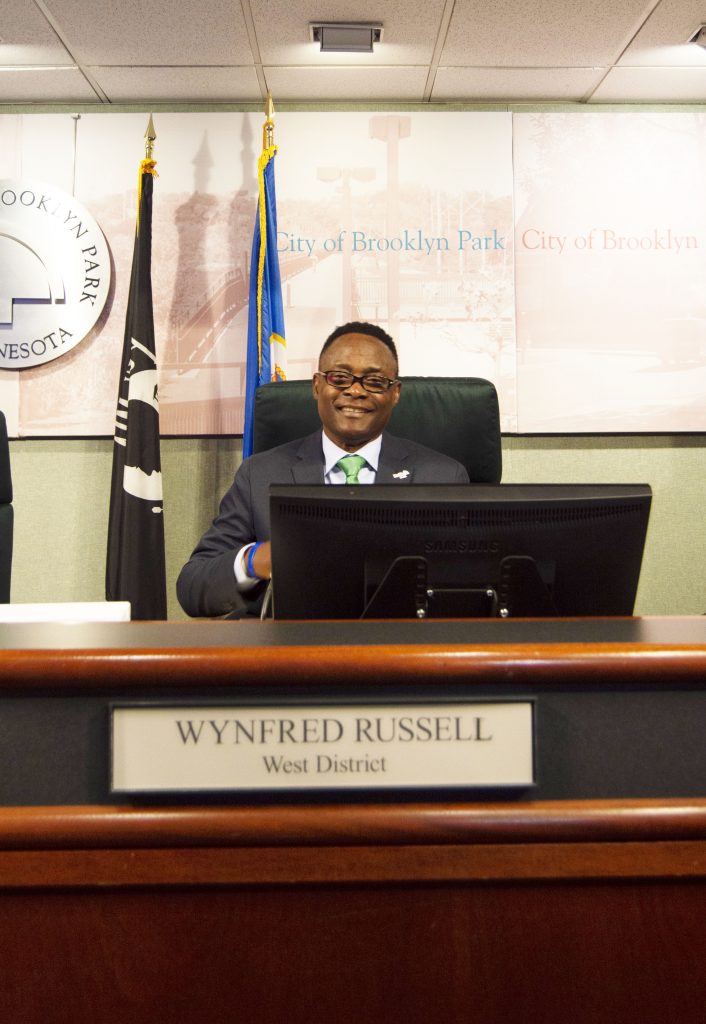
“We didn’t get elected because Minnesota is nice,” he says. “We got elected because it’s changing, and the people of our community want to be at the table. That scares some folks. They are not going to give up power easily and help mentor us.”
Indeed, Minnesota is changing, especially in the areas surrounding the Twin Cities of Minneapolis and St. Paul. More than 125,000 people living in Minnesota were born in Africa, according to Migration Policy Institute. About 83,000 of them were born in eastern Africa, mostly Somalis who came to the United States as refugees. There are an estimated 35,000 Liberians in the state, according to International Institute of Minnesota. Both Brooklyn Park and Brooklyn Center are minority-majority cities, with 55% and 67% of their populations being people of color, respectively.
According to 2020 U.S. Census data, people who identify themselves as Black or African American make up 29% in Brooklyn Center, and 29.1% in Brooklyn Park, making them the single largest minority group. African immigrants call the two cities “Little Africa.” Now community leaders are trying to rally people to make sure local governments reflect their population.
Like Russell, Elliott found himself with similar challenges of trying to fit in when became mayor.
“Because the bureaucracy does not reflect the diversity of the community, it makes it harder for people who attempt to bring a different perspective to the government,” he explains.
It also didn’t help Elliott’s transition that when he was sworn in, Brooklyn Center’s charter limited the mayor’s power to ceremonial roles, opting to place the responsibility of running the city in the hands of a city manager. In fact, Elliott didn’t even have office space at City Hall.
But all that changed on April 11, 2021.
On that day, Elliott says he was taking an afternoon walk in the park. He received a message notification on his phone. He doesn’t remember if it was a voicemail, or text message. It could have been an email. But one thing that is clear is that the contents of that message forever changed his job as mayor of Brooklyn Center.
“Initially there, wasn’t an indication that, Brooklyn Center police had shot someone,” Elliott says. “It was just that there was a shooting.”
It wasn’t until after he called a member of his staff that the magnitude of the shooting became apparent to the mayor. A Brooklyn Center police officer had shot and killed an unarmed Black man during a minor traffic stop. The officer was later identified as Kim Potter, a 26-year veteran of the police department. She claimed she accidentally shot 22-year-old Daunte Wright because she mistook her handgun for a taser.
The place and timing of the shooting couldn’t have been worse for Elliott and Brooklyn Center. The site of Wright’s killing was a mere a 15-miute drive from where a year earlier Derek Chauvin, a Minneapolis Police Department officer murdered George Floyd, another unarmed Black man. The killing sparked months of national protests against police brutality. At the time Potter killed Wright, Chauvin’s trial for the murder of Floyd was taking place only 10 miles from Brooklyn Center. Elliott knew it was only a matter of time before protesters descended on his city. He needed to come up with a plan to protect lives and property.
“I knew that we were facing an important moment in our history,” Elliot says. “We needed to act in a way that didn’t make the problem worse – to start to lay the groundwork for how these situations should be responded to in a way that honors the humanity of the people who are mostly affected by these seemingly intractable problems.”
Elliott’s swift action following the shooting might have saved the city from the wrath of protesters. He was quick to condemn the killing of Wright, when other mayors might have delayed.
“I followed what I thought was the right thing to do,” he explains.
On the day after the shooting, the City Council voted to give Elliott more power to lead the city’s response to the crisis. He fired the city manager. He took command of the police department, and accepted resignations of the police chief, and the officer who killed Wright. He released footage from the shooting. And he ordered the police to stop using rubber bullets and teargas on protesters. When asked whether he thought of the consequences of his actions – given that other mayors who have faced similar problems have moved much slower – he pauses for a while before answering.
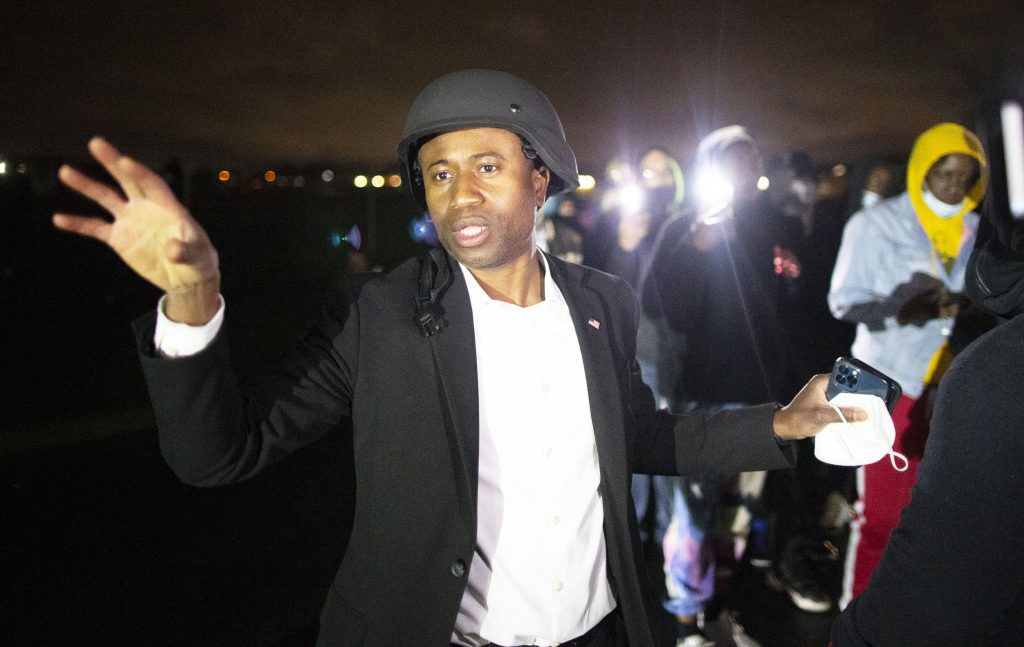
“In my mind, there was no contradiction between what is fundamentally right and humane,” he says. “I thought that gassing human beings was wrong when the Nazis did it. It was wrong enough to be banned in war internationally. So, if soldiers fighting to kill each other are not allowed to gas each other, why should civilians, who are not trained to defend themselves, be gassed? It’s just wrong on every single level.”
Perhaps the most important thing Elliott did is how he handled protesters. He went out to the streets himself to persuade them to be peaceful. He set up listening sessions but did not want to have them at City Hall. It is a mediation technique he says he learned from his childhood in Liberia. Instead of the people going to the chief’s office for community meetings, the chief traveled to them and held meetings in various villages. Elliott held one of the city council meetings outside, in front of the police station where protests were.
“It was not us, sitting up high on the dais, but getting down, walking, and going into the community under the tree, if you will, where people are,” he says. “We wanted them to talk to us and have us listen to what their concerns were, and what they wanted to see different.”
What came out of those listening sessions has made Brooklyn Center a model of how to deal with issues of police reform. The City Council passed the Daunte Wright and Kobe Dimock-Heisler Community Safety and Violence Prevention Resolution. (Dimock-Heisler was also killed by Brooklyn Center police).
In September, Brooklyn Center changed its policy to require police officers to issue citations and release people accused of misdemeanors and gross misdemeanors, instead of arresting them. The policy does not apply to felonies, or offenses that involve guns.
“We’ve seen too often, these minor infractions lead to deadly interactions with the police,” Elliott says. “So, that was our way of decreasing the possibilities that something very minor can lead to police shooting and killing someone.”
Huldah Momanyi-Hiltsley, a resident of Brooklyn Center and the president of Mwanyagetinge, the largest organization of Kenyans in Minnesota, says the creative way Elliott has managed the fallout from Wright’s shooting shows that African immigrants in elected office can be very instrumental in solving the problems of their communities.
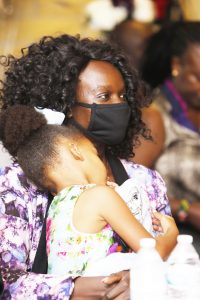
State Senate on Thursday, September 16, 2021. Photo: Richard Ooga/Mshale
“We bring a different perspective in terms of our experiences, and it adds to this fabric of what America is,” she says. “That experience comes through the different, unique cultures that we bring along.”
Momanyi-Hiltsley recently launched her 2022 campaign for the Minnesota State Senate to represent District 40, which covers Brooklyn Center and parts of Brooklyn Park. She says the time has come for African immigrants to flex their muscles and get involved in leadership. But do to so, they must begin thinking of the United States as their permanent home, instead of as a country belonging only to those born here.
“I came here when I was nine, so I have this passion for Kenya and our people there, but as time has gone by, I’ve realized that, yes, it’s good to have that passion, but we have to be engaged here as well,” Momanyi-Hiltsley says.
She says she began to look at America as home three years ago when she gave birth to her daughter.
“That’s when I realized that all of this passion that I have for Kenya is great, but my kid is growing up here,” she says. “So, I need to invest here. I need to engage here more than I have in the past. That’s what drove me to a lot of the decisions in terms of leadership and community involvement that I’ve made in the last couple of years – to participate in the politics of where I live, where I work, and where my child is growing up.”
However, Momanyi-Hiltsley acknowledges that changing that mindset will not easy, as African immigrants still have strong bonds to their countries of birth. Russell agrees.
“We never really unpacked,” he says, with a laughter. “Most of us still have our suitcases packed, waiting decades for the day we shall return to Africa. But we need to realize that instability in Africa has killed our dream of returning and begin building our lives here, where we are raising our children.”
All three leaders say that although energizing African immigrants to vote on Election Day is challenging, getting them engaged to help their representatives address the problems they were elected to address is more difficult. For example, Russell says African immigrants are missing from boards that make important decisions but don’t require elections.
“Decisions are being made without us,” Russell says. “Remember, if you don’t have a chair at the table, you are on the table; you are the menu. We get so focused the politics of Washington, D.C., when most policies affecting us are made by cities and counties. President Biden cannot reform the police force, for example. That’s the city council’s job. Folks need to understand that.”
Elliott says generally people lose enthusiasm once elections are over, though it’s more noticeable that African immigrants are missing from key policy discussions in cities where they have significant population. But he says leaders like him cannot afford to give up, and must come up with culturally appropriate ways to get their communities engaged.
“Government buildings can be very intimidating,” he says. “There are people in our community who get shocked when they see that I don’t walk around surrounded by group of people. We have to be creative to ease their fear of government. We have to go to the people and make them comfortable so they can come to us and help us do what they sent us here for.”
About Edwin Okong'o - Mshale Contributing Editor
Edwin Okong'o is a Mshale Contributing Editor. Formerly he was the newspaper's editor.

